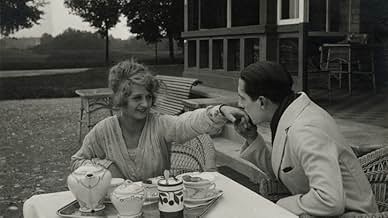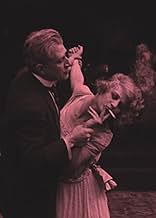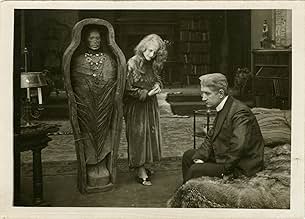Ajouter une intrigue dans votre langueA Parisian museum director believes his wife has lost interest in him and so places a poisoned cigarette in the box on his desk - thus allowing chance to decide the moment of his death.A Parisian museum director believes his wife has lost interest in him and so places a poisoned cigarette in the box on his desk - thus allowing chance to decide the moment of his death.A Parisian museum director believes his wife has lost interest in him and so places a poisoned cigarette in the box on his desk - thus allowing chance to decide the moment of his death.
Histoire
Le saviez-vous
- AnecdotesThe earliest surviving film of pioneering feminist filmmaker Germaine Dulac.
- GaffesWhen Denise relates to Pierre her switching of the cigarettes in the box, the flashback shows her closing the box after filling it with the new cigarettes obtained from a cabinet. She then closes the cabinet door and returns to Pierre's office, where she is then holding an open cigarette box, which she closes again.
- Citations
Pierre Guérande: What's the use of struggling against such youth?
Commentaire en vedette
Like no few other surviving silent films, this one isn't without its wear and tear; there's extreme, very unfortunate deterioration seen throughout of the print that was ultimately digitally preserved. I'm of the mind that this only adds to the charm of such fare, however, and moreover this isn't the only commonality 'La cigarette' shares with its kin, for despite its age it looks pretty fantastic - the costume design, hair, makeup, sets, and filming locations are all gorgeous. Louis Chaix's cinematography tends toward the simpler side of what we saw in these early years of cinema, but his work is admirable nonetheless, and instances of close-ups or tightly focused shots are most welcome. The editing is more than suitable, and filmmaker Germaine Dulac had a keen eye for orchestrating shots and scenes with recognition of the very visual nature of storytelling in film. I rather believe this movie is also a fine credit to the cast, whose acting tends to be more nuanced and natural than what we often saw in contemporary titles (e.g., exaggerated facial expressions and body language in compensation for lack of sound, and ported from the stage). Even among a small assemblage Andrée Brabant and Gabriel Signoret stand out most in the chief roles, but the same goes for everyone in front of the camera. Despite the ravages of time, this feature quite has all the makings of another silent classic, including some artfully rendered intertitles.
Truly, in every aspect of its craftsmanship this is marked by obvious skill and intelligence. I'm a smidgen more divided on Jacques de Baroncelli's screenplay - not because it's bad, but just because it's highly demonstrative of the more simple and straightforward side of the silent era. This, too, is no abject fault per se, but it does mean that from a narrative standpoint 'La cigarette' is arguably less distinguished. Exemplifying the point, the thrust of the plot is repeated again and again even from earliest scenes as a facet of Pierre's work, and the whole comes off as a tad heavy-handed as a result. Still, there's just enough detail in the writing to offset that plainspokenness: smartly rendered dialogue, as related through intertitles; well-rounded scene writing that adds a degree of tension to the proceedings, and keeps us locked in; slight variables in plot development to add to the drama. There are even notable themes on hand, from love, jealousy, and suspicion, to dynamics between men and women, difficulties that come with age gaps in any social interaction, and more. There's no singular stroke of brilliance anywhere herein, but despite subjective forthright gawkiness in the melodrama and how it's accentuated from the start, there are also no substantial flaws. This is really pretty well done all around.
I don't think there's anything so special about this picture as to fully demand viewership. There's no major beat of drama - this actively declines any, in fact - and it may not even particularly stand out in a crowd among other works of the same period. Recognizing that cigarettes are viewed differently around the world, there's nevertheless also something to be said for how well the fundamental premise has aged over time (or rather, how poorly), let alone the ending. Still, the overall vibe is one of lovely warmth and pleasantness, and 'La cigarette' is more than enjoyable enough for something to watch on a quiet day. Don't necessarily go out of your way for it, but if you do have the opportunity to watch, this is a tiny slice of cinema history worth revisiting.
Truly, in every aspect of its craftsmanship this is marked by obvious skill and intelligence. I'm a smidgen more divided on Jacques de Baroncelli's screenplay - not because it's bad, but just because it's highly demonstrative of the more simple and straightforward side of the silent era. This, too, is no abject fault per se, but it does mean that from a narrative standpoint 'La cigarette' is arguably less distinguished. Exemplifying the point, the thrust of the plot is repeated again and again even from earliest scenes as a facet of Pierre's work, and the whole comes off as a tad heavy-handed as a result. Still, there's just enough detail in the writing to offset that plainspokenness: smartly rendered dialogue, as related through intertitles; well-rounded scene writing that adds a degree of tension to the proceedings, and keeps us locked in; slight variables in plot development to add to the drama. There are even notable themes on hand, from love, jealousy, and suspicion, to dynamics between men and women, difficulties that come with age gaps in any social interaction, and more. There's no singular stroke of brilliance anywhere herein, but despite subjective forthright gawkiness in the melodrama and how it's accentuated from the start, there are also no substantial flaws. This is really pretty well done all around.
I don't think there's anything so special about this picture as to fully demand viewership. There's no major beat of drama - this actively declines any, in fact - and it may not even particularly stand out in a crowd among other works of the same period. Recognizing that cigarettes are viewed differently around the world, there's nevertheless also something to be said for how well the fundamental premise has aged over time (or rather, how poorly), let alone the ending. Still, the overall vibe is one of lovely warmth and pleasantness, and 'La cigarette' is more than enjoyable enough for something to watch on a quiet day. Don't necessarily go out of your way for it, but if you do have the opportunity to watch, this is a tiny slice of cinema history worth revisiting.
- I_Ailurophile
- 24 mai 2023
- Lien permanent
Meilleurs choix
Connectez-vous pour évaluer et surveiller les recommandations personnalisées
Détails
- Durée51 minutes
- Couleur
- Mixage
- Rapport de forme
- 1.37 : 1
Contribuer à cette page
Suggérer une modification ou ajouter du contenu manquant

Lacune principale
By what name was La cigarette (1919) officially released in Canada in English?
Répondre




















